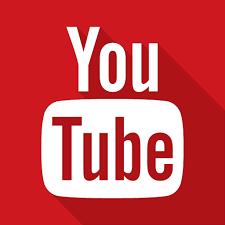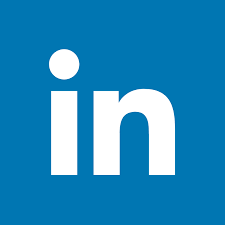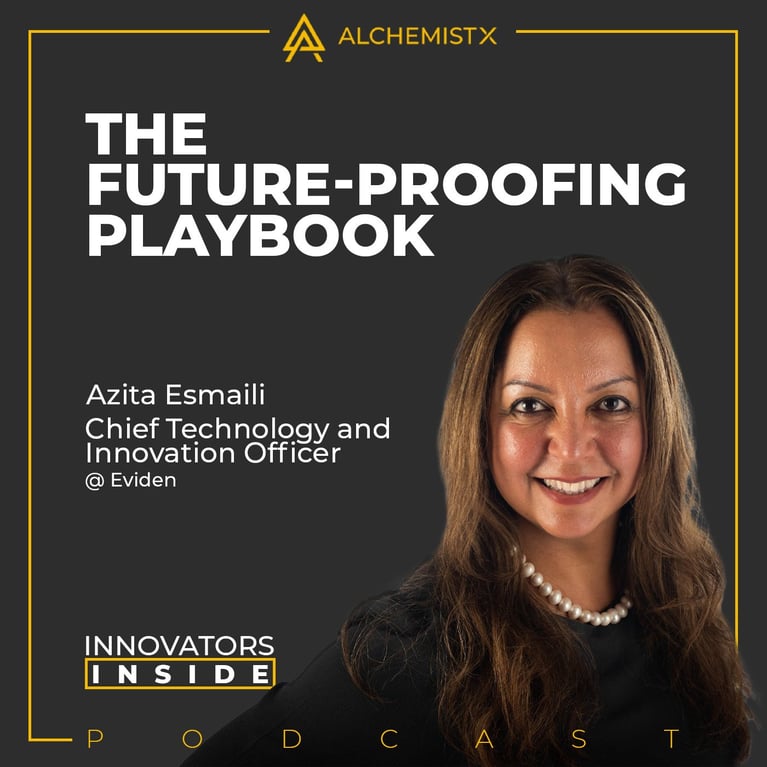Azita Esmaili, Chief Technology and Innovation Officer at Eviden explores the dynamic interplay between AI, innovation management, and future-proofing organizations.
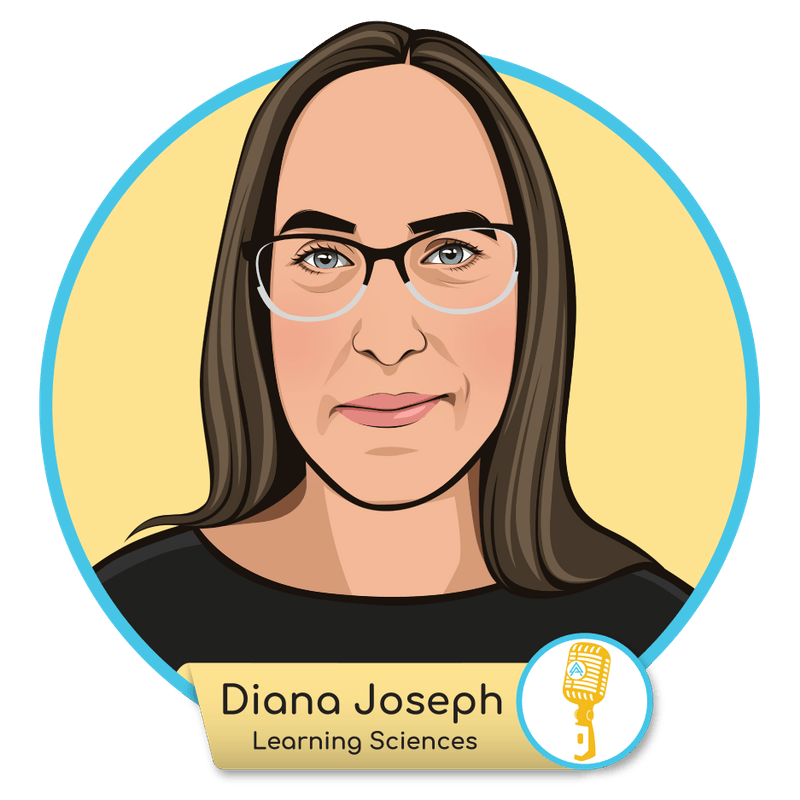
AlchemistX: Innovators Inside
E.23 - Diana Joseph: Learning Sciences
Published on
November 11, 2021
"Organizations and individuals being more entrepreneurial will help us get to better solutions on climate change, climate justice, diversity, equity, inclusion and taking advantage of the wisdom of more voices." - Diana Joseph
Show Notes
Rachel Chalmers:
Today, I am excited to welcome Dianna Joseph, CEO of the Corporate Accelerator Forum. Diana is a veteran of Citrix Systems and Adobe, and has studied at Stanford and Northwestern. A former high tech innovation director with a doctorate in learning sciences, Diana brings together techniques from motivational psychology, education, design, thinking and lean startup. Her work helps individuals and organizations become more innovative and entrepreneurial. Diana, thank you so much for joining us today.
Diana Joseph:
Thank you for having me. I'm honored.
Rachel Chalmers:
I would love to hear more about what's happening with the Corporate Accelerator Forum.
Diana Joseph:
Great. The Corporate Accelerator Forum is a group by and for corporate innovators who work with startups. In addition to the many things that we do over the course of the year, we hold a flagship event. This year we're calling it Unleashing Startup Innovation, and it takes place on December 7th, 8th and 9th. Online in the mornings and rules permitting, we'll be doing site visits in the afternoons, visiting Bay Area corporates to see what they're actually doing on the ground. We're deep in the design and curation mode right now. You mentioned I'm a learning scientist, so I like to draw on those principles and mindsets to create something that's really sticky, really interactive and really memorable. There is a way to take those ideas home and implement them. We're going to be digging into ecosystems this year and into the structures inside of companies, what needs to move, how to do that, and also at the specifics of startup engagement, the strategy for engaging startups on the ground. I'm excited to be focusing on that right now.
Rachel Chalmers:
That sounds really awesome. Can you tell us about some companies that you've seen excel at corporate innovation? And even more interestingly, some of the anti-patterns, some of the companies that you've seen struggling?
Diana Joseph:
On the side of excelling, I've been reflecting back on my time at Adobe. I ran a group called Learning Research within a group that changed from being Learning Resources on the day I arrived to the name Community Help and Learning. I was there to help folks who had been hired as writers to document every single feature in the software. Let's say in Photoshop. Remember, Photoshop used to come in a really fat box. I was hired to help the people who wrote those books move into a position where they were really more like anthropologists and curators trying to understand who out in the community were the real experts and who exactly really needed what in order to get better at using Adobe software.
It was a very, very big change, and we were early because it's easy to change the learning resources online. Eventually, it became a subscription and that change is reflected. You can see the success of that transition in the stock price today. I really think the key was transparency. They told everybody what was going to happen and they stuck to their guns during a really turbulent time.
Rachel Chalmers:
I was at Autodesk right at the end of that transition to subscriptions, and we were trying to drive a similar push to the cloud to see similar returns in the stock price. We would look at Adobe and we would try to learn lessons from your success because it is incredibly difficult to get everyone coming along with you. Particularly in companies like that, that started out as desktop software companies, where the developers have to give up access to their databases in order to share backend infrastructure. They've grown up thinking, “Oh, I'm brilliant because I can fit everything into the very tight parameters of this desktop architecture.” Then comes a time when brilliant is letting go of that tight control. It's a really challenging transition to make.
Diana Joseph:
So that's something that I've been holding on to lately, and I think that transparency was a really important component.
Rachel Chalmers:
I wonder if Adobe did a better job because from the outside, at least, that company had a culture of really good documentation of respect for the so-called soft skills that are really core skills of communication and making things understandable, making things legible. I wonder if leading from community help rather than a top down mandate made that transition a little more possible.
Diana Joseph:
To your point, Adobe was very high on the list of best companies to work for even when I joined and has maintained that position, I think that's a real key. Another one that I would point to as a success is Illumina. The Illumina Accelerator, now Illumina for Startups, is the founding sponsor for the Corporate Accelerator Forum. I think the key there is that Mostafa Ronaghi, who was the initial internal champion, is a huge entrepreneur himself. He really understands startups and he and Amanda Cashin, who's been leading the effort, were very committed right from the beginning to be founder friendly. If folks are interested in that one, Amanda and I wrote a paper in the Journal of Commercial Biotechnology. We're doing a close look at why it works, how the alignment was built within Illumina and in the structure of the accelerator.
Rachel Chalmers:
It's a fascinating topic because of course, all of us who do accelerator work really love it. What's lagging a little, and we're all confident it will come, is the academic demonstration that these techniques that we're deploying actually do produce positive change. I'll be really interested to read that paper. We're also working with a client up in Canada to document a set of accelerators that we're running up there and try and quantify how many jobs, how much income it brings to the region.
Diana Joseph:
That's fantastic. I would love to see that. That's great. I think that's so important. And also, does it solve the big problems that we all really need to solve? I have a strong hypothesis that organizations and individuals being more entrepreneurial will help us get to better solutions on climate change, climate justice, diversity, equity, inclusion and taking advantage of the wisdom of more voices. I want the academic work done too.
Rachel Chalmers:
I couldn't agree more. I think we're all drawn to this work because we want to know how to effect positive change. So we have a strong intuition that somewhere in these techniques, there's something that we're doing right. But getting to demonstrate that in a peer reviewable way is a super exciting project
Diana Joseph:
On the topic of anti-patterns. I think it's all about structure. We talk a lot about the frozen organization and we say it comes in two different flavors. There's the frozen top, where you have leaders who are confident in the cash cow lasting forever. They've seen other companies get disrupted, but they don't think it's coming for them or if it comes for them, they'll manage to survive somehow. The other flavor of it is the frozen middle. That's where you have the senior leaders saying something really positive and encouraging about what's going to happen with innovation, even asking people to make commitments. You have people on the ground who are really excited.
Then in the middle, nothing has changed about their incentives. In other words, not only are they getting paid to do execution and not paid at all to do innovation. Also, that's the message that the organization is sending. The words are saying, “Please innovate” but the structure is saying “Please don't innovate” and nobody can navigate that. It's too much to ask of the middle managers. That's a really challenging anti-pattern.
Rachel Chalmers:
I've lived that one. It's both, in terms of the incentives and in terms of the temperament, because it's different kinds of people that want to do innovation versus doing maintenance. I have every respect for maintenance. SRE’s are gods in my eyes. Maintenance is a ritual and a ceremony, but it's a completely different set of skills and outlooks and temperamental traits from moving fast and breaking things. Organizations that try and get people to do both at once don't understand that they're actually in creative tension with one another.
Diana Joseph:
You're so right. It makes me think about the ambidextrous organization, and there are so many ways to be ambidextrous. You can be ambidextrous in time. You can have the same people doing both things, but at different times, maybe everyone rotates out for a year and rotates back in. You can have different people do it. There are lots of ways to slice it, but it has to be sliced. You can't do both at the same time.
Rachel Chalmers:
So we've touched on the anti-patterns more broadly. Why is corporate innovation so hard? Why did we spend our careers beating our heads against this and celebrate our few successes?
Diana Joseph:
I do think it's really about the structures. I think people get very annoyed about someone else's mindset or willingness to get on board with something. It's structural. I think the harder and less visible challenges are structural. If we don't change that, the mindset stuff is never going to get us where we want to go. There's one structural component, “How much can you participate in an ecosystem?” It's really hard to do disruptive innovation in house because structurally you have to be focused on the short term. You're beholden to quarterly reporting and almost every public company. Reaching out into the ecosystem to a place like AlchemistX, there are incubators and accelerators and VCs that want you to be partners and startups that are reaching out. If you can't take in those inputs, it becomes very difficult. If you don't have the structures to take in those inputs.
Another structural issue is the champion. Everyone in our industry understands that you have to have a champion, a very senior champion. The nuance that I've been learning, even in the last few months, is that it matters who the champion is. Not just their level of seniority, but what kind of organization they are running structurally. If you're reporting into HR or you're reporting into marketing or really anything that's a cost center, that person, even if they're a wonderful champion, probably the most runway they can get you is three or four years. You're not going to get ROI in three to four years. So everyone else who's dependent on ROI is going to say no at that point. If you're looking to build something that's really sustainable inside a corporation, that structure has to get addressed. You have to have a champion who runs a P&L, who runs product, something where they're on the line for money and when they are investing their time and attention and dollars, then there's a possibility.
Rachel Chalmers:
You have to spend political capital, but there's different kinds of political capital to be spent.
Diana Joseph:
Yeah, so that's what I'm trying to understand better actually. I've just spoken recently with Scott Kirsner at Innovation Leader, and we're going to be bringing some folks together to tell some stories and help us understand how right our hypothesis is on that front. Another structural piece is incentives. We talked about that a little bit before. If your bonus is all about execution, that's what you're going to focus on.
Rachel Chalmers:
When you look back on your career to date, what are you proudest of?
Diana Joseph:
I like that question. I have a complex relationship with pride. If we frame it in terms of achievement, I kind of peaked in high school. I was winning things and I was the star of everything. You mentioned I went to Stanford and I've sort of come to understand how much of that had to do with privilege. I'm still really glad I had those experiences, and I still feel that they were earned to some extent. But it's not on a level playing field, and that's kind of helped me release the attachment to being the star all the time. I aspire to be more ambitious about impact than about prizes.
I'm not there yet, but I've done a lot of work in urban education. I was proud of doing the right thing. I did not feel like I was all that effective. Something that I'm proud of just recently, I'm the board chair of a tiny little nonprofit theater company called Playful People Productions. We are going through an executive director transition and we're doing it so well. The outgoing and incoming executive directors are just handling it so beautifully, and I feel I had something to do with that. I'm really proud of that. I'm proud that I went out to try and be an entrepreneur as a middle aged person.
Rachel Chalmers:
It's interesting that you choose those examples where a lot of times you're taking experiences that you've accrued in the world of corporate innovation and applying them outside. Do you feel that your corporate innovation track record leaves something to be desired or are you just being modest?
Diana Joseph:
That's a good question. I was directly in corporate innovation for about three years. I'm proud of the lessons that I learned there, so I think I was effective in that sense. I really came to understand that sending everybody to design, thinking, training or running, design, thinking, training for ourselves, we would get some beautiful epiphany moment, but we wouldn't necessarily get change. I thought it was going to be magic and it didn't happen that way. I'm proud of the insights that we had about that. I'm proud of the step. I think I was effective in taking the step to work with the startup accelerator and see what was happening.
I had been working internally and then shifting to the startup accelerator to understand what the startups were doing and what would be effective there, that was exciting. Then the company was taken over by a hedge fund, so we didn't really get to try it to the extent that I wanted to. I love your question. I don't feel like I have a lot to point to in terms of famous successes while I was a corporate innovator, but I do feel like there were some really valuable lessons that we can share.
Rachel Chalmers:
And that's what you've distilled into the corporate accelerator forum and you're trying to create that learning crucible for other professionals.
Diana Joseph:
So well put. I'm taking the word “crucible”. I love it. Yes, that's what I'm trying to do.
Rachel Chalmers:
If you had a do over, if you got to go back in your career and do one thing differently, what might that be?
Diana Joseph:
I'm a generalist. I've had many, many different experiences in my career and I can see a through line now. It took me a long time, but I can see a through line now and I can tell that story. Then I look at people around me who specialize and I wonder, maybe I should have done that. One of my best friends from college just got his second Tony. I directed the debut of one of his plays when I was in college. Maybe I should have just attached myself to him. Also I got the doctorate. A lot of my friends from graduate school are professors doing wonderful work. Maybe I should have done that. But I didn't. And so what I have to work with is my particular life experience and this particular combination of overlaying things. Like anybody because I have this particular combination, I can make a unique contribution. So here I am. I turned out to be a generalist.
Rachel Chalmers:
So how do you distill all of those experiences into lessons that you can impart to other people?
Diana Joseph:
I think it's really helpful to have the social science and learning sciences background. I can't say I'm an ethnographer per say, but I know what ethnography is, and I've practiced it a fair amount. I've done hundreds and hundreds of interviews between all the different projects that I've done. I know what an interview feels like. I know how to listen for what the person is not saying. Maybe one of the advantages of being a generalist is that I'm thinking about very different things at the same time, and sometimes I can pull a thread from one context. Something that I'm seeing on the street will connect with something that I'm hearing from a corporate accelerator forum member will connect with something that I'm reading in the newspaper. I really enjoy the experience of pulling all that together and then sharing it back and testing it with people to see if it'll work.
Rachel Chalmers:
Could you say a little more about ethnography for the people who aren't addicted to the library and already know what it is?
Diana Joseph:
Fair point. Fair point. I suppose it's literally the study of people. Ethnography is connected with anthropology, and it has to do with studying what human beings are actually doing on the ground and in the field. So the analogy, I suppose, or the context is cultural anthropology, where you imagine an anthropologist going out and living with people from a very different culture. There are people who do that with indigenous folks who are still living very close to the land. And there are also people doing that, going and studying scientists or going and studying business people living alongside them. The tools of ethnography include observation, interviewing and participation.
Rachel Chalmers:
It's a perfect opportunity for me to shout out one of my favorite books. It was written in 1996 by Hugh Gusterson. It's called Nuclear Rites. He was an anthropologist who embedded himself at Lawrence Livermore Labs out in the East Bay and described the ethnography, the culture of nuclear scientists, people who were designing and testing nuclear weapons. What he found was that as much as you were talking about Stanford and prizes, for a nuclear physicist, the bomb test is a rite. It's a rite of passage. It's a large, visible accomplishment that no one can deny with really significant career implications. The reason I bring it up is because I think about it a lot, in my work in corporate innovation, in that sometimes we are incenting people to make a big explosion. That big explosion is not actually in the larger interests of our society. The need to create positive change starts with the need to create, just as you were saying. To create cultures that produce the outcomes that we want and that don't inadvertently produce incentives for negative outcomes.
Diana Joseph:
It's so challenging because of the structures that exist. I really love the way that you're talking about it. Let's all go read it. I think making it explicit that that's what's happening could potentially really help us. Like, “Wait, guys, are we building the bomb here? Or is this going to be something that has long lasting value for all of us?”
Rachel Chalmers:
When we look at some of the largest tech companies that have been the most successful, they're not actually creating net new value. They're apologists would say they're liberating value from preexisting structures that weren't themselves particularly positive. But if you're just destroying a taxi monopoly to create Uber, you still have too many cars on the streets, and we need to take a step back and think about what those larger goals are and how we create paths to those goals.
Diana Joseph:
Yeah, I think there's a way. There's a version of this in which drivers, whether they were taxi drivers before or Uber drivers now, there's a way in which drivers thrive and the rest of us don't need cars anymore and there's less cars on the street. But that's not necessarily the same way that also gets lots and lots of money. It gets to maybe OK money and not lots and lots of money. Somehow we have to loosen our relationship with money.
Rachel Chalmers:
Yes, I agree. Diana. How on earth do you avoid burnout?
Diana Joseph:
You know, I don't think I'm at risk of burnout. I don't work that hard.
Rachel Chalmers:
So few people admit it, and it's such an admirable thing.
Diana Joseph:
Thank you. Thank you. I think it partly has to do with being older in a couple of ways. One is that I have a lot to draw on. I had a client recently that was like, “Oh my God, you must have worked so hard on this.” And I'm like, “No, that came out in one draft because I already have had a lot of those thoughts and I already have practiced moving thoughts through my fingertips into my keyboard a lot.” I'm benefiting from the investment that my younger, more achievement oriented self put in. All the work and learning that I did when I was younger is paying off now. Also, I have children, I have teenagers and they're going to grow up and leave and I want time with them. So I don't really work when they're around. I like my sleep. There comes a time in the evening when I'm just like, This is not going. Tomorrow I can do it in one draft, but if I do it now, it's going to take so much longer and be nowhere near as good.
Rachel Chalmers:
Your efficacy goes down. I know when I'm tired, I make way more mistakes than if I'm well rested. Then I'm working to fix the mistakes that I made.
Diana Joseph:
Totally. The one nuance on that is if I'm not stressed out, I do think I'm more creative when I'm tired. I just have less inhibitions and I can have a wilder idea. But if I'm trying to accomplish something, the last thing I want is to be that creative, you know, I just want to finish it, and I just can't when I'm tired.
Rachel Chalmers:
There's other ways to get past those inhibitions. There's deliberately telling yourself to ignore your internal editor, which probably isn't as effective, but you can practice it. It's arguably better than taking advantage of your own fatigue.
Diana Joseph:
If it's not a stressful situation, and I'm just tired because I'm tired, then it can be kind of dreamy and fun, and I don't mind so much.
Rachel Chalmers:
What is the best way for our listeners to connect with you or to follow your work?
Diana Joseph:
You can follow the Corporate Accelerator Forum page on LinkedIn. We have a lot of activities going on all the time. You can find out about it there. Our website is corporateacceleratorforum.com. We have a calendar and we have some things that we're doing regularly. Most weeks we record something called the Ecosystem Show and we publish it as a podcast later. It's a live conversation on Mondays. On Tuesdays, we have a forecasting salon called Weak Signals, the next one, I believe, is called Education, Employment and Academia. We're going to try to understand that system and where it needs to go.
Rachel Chalmers:
Three vexed topics that get vexed together.
Diana Joseph:
Let’s get vexed together. Exactly. But of course, no one will hear it right now, so there'll be a different topic for Tuesday. But it happens every single time with my co-host Margarita Quihuis, who's the director of the Peace Innovation Lab at Stanford. Then we have a drop in open session online on a platform called Gather Town. It's called The Water Cooler, and every other Thursday morning, we just bring folks together to chat. You can find out about those on the LinkedIn page and on the site.
Rachel Chalmers:
What does the future look like for you personally? You mentioned that you're enjoying your teenagers. I totally relate. Parenting teenagers has been the best part. They're into cool bands. You can introduce them to your favorite films. You put all of this work into making them people that you'd want to hang out with and then you get to hang out with them.
Diana Joseph:
Yeah, that's a good way to put it. In my personal future, my household will change over the next few years. So that'll be interesting. Right now I have, speaking of vexed questions, I have a question. I mentioned it before. I'm really grappling with this question about who in the organization can lead change, and I really want to understand that. I think that it might be a lever that we can be really, really useful to the whole industry. And certainly my understanding on behalf of the forum will be really meaningful. If the leaders with power aren't on this journey with us, that's really interesting and we have to figure out how to address it.
Rachel Chalmers:
In my experience, the clients that have that kind of empowerment are typically an innovation group, but one that has been put together by an organization sufficiently conscious of its future risk, that it has a lot of autonomy and a lot of access to resources. That's the pattern that I've seen be less hamstrung than others.
Diana Joseph:
How can we help companies who are currently engaged in innovation theater or have even gone through the cycle and have decided that they don't need to do innovation because of the failure of innovation that was not really ever going to be successful because it was theater? How do we move companies like that into a place where they can get more done?
Rachel Chalmers:
Five years from now, you have been God emperor behind the scenes. Everything has gone as you would hope. 2026 is the future that you would build. What does it look like?
Diana Joseph:
The stuckness is gone because as God emperor behind the scenes, there is no more stuckness. That means that any conversation that is potentially productive can happen. We are trying out so many things and we have the resources to make a real try. There are solution experiments going on in every arena. We have loads and loads of black people, women and people of color and queer people on the boards of organizations so that wisdom is in at the power level. I would love to say that we've solved a whole bunch of problems. Five years seems too soon to have actually finished solving, but we're moving in the right direction.
Rachel Chalmers:
It's interesting that the core of your answer is just that democratization of resources that we're going to recognize that ingenuity and insight comes from anywhere and that we shouldn't be hoarding resources and constraining them, which is a really interesting position for someone from Stanford to come to. So congratulations on your journey.
Diana Joseph:
You know, I have to say, Stanford was a really important part of that journey. I was there during the AIDS epidemic. I took a class about AIDS, and then I did HIV outreach in East Palo Alto. East Palo Alto, I believe, has changed a lot now. I haven't been there in a while, but at the time it was very poor right next to Palo Alto, which was very, very rich. Walking through the streets of Palo Alto and seeing that there aren't jobs. Everyone's out on a Thursday afternoon. It really helped me move from an assumption that I think I had, that all success is earned to I was right next to people's shoes. It was easier to put myself in their shoes, like, what would I have done if I lived there and it was a Thursday afternoon? Where would I have gotten a job? How would I have gotten to Stanford? I don't know.
Stanford really changed my thinking in a really profound way, and I'm glad I was there. I also think yes, ingenuity comes from everywhere. We should be good people and make sure we're including everybody. But it's also partly, we can't solve this alone. I talked about being a generalist. I really like that I have fingers in dozens of different pies and I can make these connections across things, but I can only make so many. I've only got one nervous system that I have access to. So people who have had a very different experience are going to see things that I can't see by myself and we've got to have everybody looking.
Rachel Chalmers:
There's yet another example of this pattern that happens in tech just announced today, Amazon Prime is going to let you send gifts to somebody with just their email address or phone number, which of course, is a gift to any stalking boyfriend or ex-husband who wants to harass their ex. It is clear that through the entire product development of that process, not only had no one ever had experience of a stalker, they hadn't followed the saga of Google Buzz, which enabled the same kinds of behaviors. That kind of group think, that kind of myopic everyone in the world has the same experience as the people in this room is just a huge vulnerability in all of our systems.
Diana Joseph:
There's the negative side. What have you ignored that would make you not do something dumb? Something that has negative consequences. Then there's also the positive side. We don't know if I'm a resilient person because I have not been challenged particularly. There's somebody who has resilience under their belt who is going to be able to see challenges, see problems that are just totally invisible to me. If you are living in a place that doesn't have clean water, you've figured out how to have clean water every day. How have you done that? People have managed, and that's brilliant stuff. If we're in the conversation together, we can make something that's much more implementable in different places versus if I go to a design thinking workshop and I come up with something I think would be helpful, but I don't know the context, it won't work.
Rachel Chalmers:
It also makes you realize that making the journey from Stanford to East Palo Alto is a gift of insight. But making the reverse journey coming from somewhere like East Palo Alto and ending up in the conversations around Stanford means that a person has traveled much further and learned so much more along the way. It gives you that perspective to really value their wisdom.
Diana, it's been such a joy to have you on the show. Thank you so much.
Diana Joseph:
Thanks so much for having me. This is great.
References
Diana Joseph on Linkedin
Corporate Accelerator Forum - Where Diana is CEO and their Linkedin
Citrix Systems - A previous employer of Diana’s
Illumina for Startups - With Mostafa Ronaghi & Amanda Cashin
Journal of Commercial Biotechnology - Where Diana wrote a paper
Scott Kirsner at Innovation Leader
Playful People Productions - Theater Diana is involved in
Nuclear Rites - A book by Hugh Gusterson where he drew from his time at Lawrence Livermore Labs
Ecosystem Show - A podcast Diana is host of
Margarita Quihuis - Co-Host of Diana’s podcast and the Director of Peace Innovation Lab at Stanford
Intro and Outromusic composed by: www.PatrickSimpsonmusic.com
Recent Episodes

New Horizons: The Intersection of Tech, Logistics, and Community in Memphis
Nathaniel shares his journey—from venture capital to spearheading Epicenter’s mission—and discusses the importance of customer discovery, building trust, and fostering cross-industry partnerships.
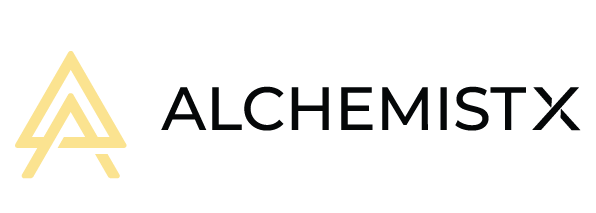
.svg.png)


